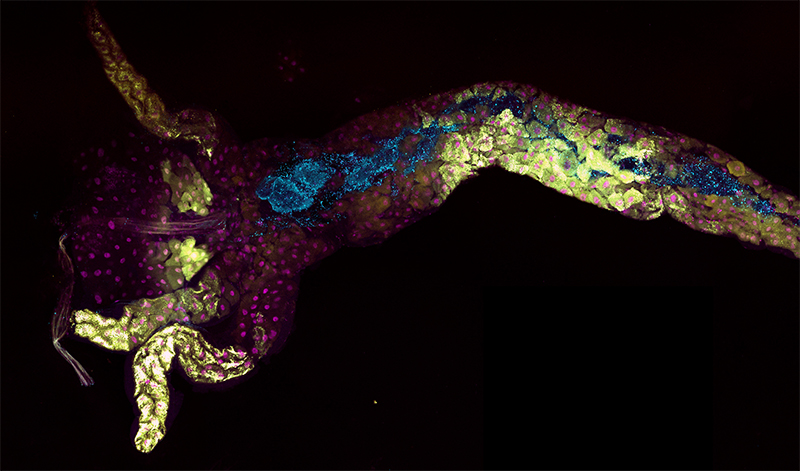Publication of the IGFL in the journal eLife on June 9, 2023. Communication on Jully 12, 2023.
In nature, it's all a matter of perception: it's by knowing their environment that living beings can react to it. Our cells, for example, are able to perceive the presence of bacteria on contact. But how? Using the fruit fly - Drosophila melanogaster - as a model, a research team led by the Institute of Functional Genomics of Lyon (IGFL, CNRS/ENS de Lyon) has described a new mechanism by which intestinal cells can "sense" and adapt to the bacteria in the microbiota. The study is published in eLife.
Abstract
Symbiotic bacteria interact with their host through symbiotic cues. Here, we took advantage of the mutualism between Drosophila and Lactiplantibacillus plantarum (Lp) to investigate a novel mechanism of host-symbiont interaction. Using chemically defined diets, we found that association with Lp improves the growth of larvae-fed amino acid-imbalanced diets, even though Lp cannot produce the limiting amino acid. We show that in this context Lp supports its host’s growth through a molecular dialogue that requires functional operons encoding ribosomal and transfer RNAs (r/tRNAs) in Lp and the general control nonderepressible 2 (GCN2) kinase in Drosophila’s enterocytes. Our data indicate that Lp’s r/tRNAs are packaged in extracellular vesicles and activate GCN2 in a subset of larval enterocytes, a mechanism necessary to remodel the intestinal transcriptome and ultimately to support anabolic growth. Based on our findings, we propose a novel beneficial molecular dialogue between host and microbes, which relies on a non-canonical role of GCN2 as a mediator of non-nutritional symbiotic cues encoded by r/tRNA operons.

Image by T. Grenier and A. Lambert.
Reference : Intestinal GCN2 controls Drosophila systemic growth in response to Lactiplantibacillus plantarum symbiotic cues encoded by r/tRNA operons. Théodore Grenier, Jessika Consuegra, Mariana G Ferrarini, Houssam Akherraz, Longwei Bai, Yves Dusabyinema, Isabelle Rahioui, Pedro Da Silva, Benjamin Gillet, Sandrine Hughes, Cathy I Ramos, Renata C Matos, François Leulier. eLifer, June 9, 2023.
DOI : 10.7554/eLife.76584





